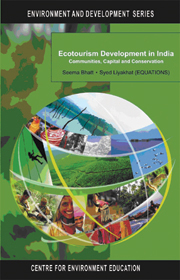Book contents
- Frontmatter
- Contents
- About the Authors
- Preface
- 1 Tourism and Ecotourism – General Introduction
- 2 International Legal and Policy Frameworks
- 3 National Legal and Policy Frameworks
- 4 Ecotourism: Voices of Dissent
- 5 Ecotourism: Some Successful Initiatives
- 6 Analysis and Discussion
- 7 Towards Sustainable Ecotourism
- 8 Ecotourism: Grounds for Protest
- 9 Ecotourism: Glimpses of Successful Initiatives
- Bibliography
3 - National Legal and Policy Frameworks
Published online by Cambridge University Press: 05 November 2011
- Frontmatter
- Contents
- About the Authors
- Preface
- 1 Tourism and Ecotourism – General Introduction
- 2 International Legal and Policy Frameworks
- 3 National Legal and Policy Frameworks
- 4 Ecotourism: Voices of Dissent
- 5 Ecotourism: Some Successful Initiatives
- 6 Analysis and Discussion
- 7 Towards Sustainable Ecotourism
- 8 Ecotourism: Grounds for Protest
- 9 Ecotourism: Glimpses of Successful Initiatives
- Bibliography
Summary
Introduction
At the national level, there exists a legal and policy framework that supports or has the potential to support ecotourism. At the state level, there are several states that have developed their own ecotourism policies or tourism policies with specific reference to ecotourism. This chapter presents an analysis of some of the key national legal and policy instruments in context to ecotourism. It then goes on to analyse some selected state tourism/ecotourism policies. There are great variations in the state policies. Analysis of these policies reveals that each state seems to interpret ecotourism in its own way. This brings to the fore, the need for a common understanding of the concept and its implementation. The sections included in this chapter are Legal Framework, Policy Framework and State Tourism/Ecotourism Policies.
Legal Framework
Wildlife (Protection) Act, 1972, Amendment 1993 and 2002
In 1972, the Parliament enacted the Wildlife (Protection) Act pursuant to the enabling resolutions of 11 states under Article 252(1) of the Constitution. The Wildlife (Protection) Act provides for State Wildlife Advisory Boards, regulations for hunting wild animals and birds, establishment of sanctuaries and national parks, regulations for trade in wild animals, animal products and trophies, and judicially imposed penalties for violating the Act. Harming the endangered species listed in Schedule I of the Act is prohibited throughout India. Hunting other species, like those requiring special protection (Schedule II), big game (Schedule III), and small game (Schedule IV) is regulated through licensing.
- Type
- Chapter
- Information
- Ecotourism Development in IndiaCommunities, Capital and Conservation, pp. 38 - 63Publisher: Foundation BooksPrint publication year: 2008



